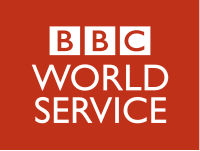BBC Radio World Service
 |
|
| Type | Radio network broadcasting news, speech, discussions |
|---|---|
| Country | United Kingdom |
| Availability | Worldwide |
| Slogan | The World's Radio Station, The BBC's international radio station |
| Headquarters | Broadcasting House, London |
|
Broadcast area
|
Worldwide |
| Area |
Broadcasting House Portland Place |
| Owner | BBC |
|
Key people
|
Fran Unsworth (Director) |
|
Launch date
|
19 December 1932 |
|
Former names
|
BBC Empire Service BBC Overseas Service External Services of the BBC |
| Webcast |
Internet Schedule Live Streaming
English News Live Streaming Africa Live Streaming |
|
Official website
|
BBC World Service |
Internet Schedule Live Streaming
English News Live Streaming
Africa Live Streaming
The BBC World Service, the world's largest international broadcaster, broadcasts radio and television news, speech and discussions in 29 languages to many parts of the world on analogue and digital shortwave platforms, Internet streaming, podcasting, satellite, DAB, FM and MW relays. It was announced in November 2015 that the BBC World Service will start broadcasting in Pidgin and Yoruba in Nigeria, which will bring the total number of broadcast languages to 31. In November 2016 the BBC announced again that it would start broadcasting in additional languages including Amharic and Igbo, in its biggest expansion since the 1940s. In 2015 World Service reached an average of 210 million people a week (via TV, radio and online). The English-language service broadcasts 24 hours a day.
The World Service is funded by the United Kingdom's television licence fee, limited advertising and the profits of BBC Worldwide Ltd. The service is also guaranteed £289 million (allocated over a five-year period ending in 2020) from the UK government. The World Service was funded for decades by grant-in-aid through the Foreign and Commonwealth Office of the British Government until 1 April 2014.
...
Wikipedia
